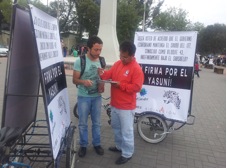By Mette Orup, YASunidos volunteer
On the Defense Day of Yasuní, March 5, Ecuador’s YASunidos movement celebrated this pristine Amazon rainforest by announcing that it had 480,000 signatures to force a national referendum on oil exploitation in one of the most biodiverse rainforests on Earth. The group is confident it will meet its goal of at least 600,000 signatures.
On October 3, 2013, the Ecuadorian government and parliament approved the exploitation of the protected area. Denouncing the decision as unconstitutional and vowing to reverse it, YASunidos embarked on the signature campaign to get the Yasuní issue on the ballot for a national referendum almost 180 days ago.
Violating Its Own Constitution

Since 2007 and up until August 15, 2013, the Ecuadorian government promoted the Yasuní-ITT Initiative, an innovative climate solution plan combining conservation, reduction of CO2 emissions, and respect for the human rights of some of the Earth’s last indigenous peoples living in voluntary isolation. By leaving the 846 million ton crude oil found under the ITT area in the ground, ‘Plan A’ was for the international community to contribute $3.6 billion to Ecuador over a period of 10 years.
When last year, it became clear to President Rafael Correa and his government that getting the international contributions would be harder than first expected, and because of failed strategy, the politicians approved ‘Plan B’: exploitation of Yasuní-ITT, without consulting the Ecuadorian population through a national referendum. By doing so the government and parliament infringed on the constitution that they, in 2008, drafted and approved: The decision violates not only article 407, but also articles 57 and 71.
Therefore, in order for the constitution, as well as the rights of every Ecuadorian citizen to be respected, a national referendum would be both appropriate and proper.
Democracy in Ecuador is being tested, and this might be the last attempt from civil society to save the Yasuní-ITT area from extractive doom.
You Catch More Flies with Honey than Vinegar

After the announcement of being close to the required amount of signatures earlier this month YASunidos voluntary signature collectors at a national level has experienced rising pressure from at least two groups trying to prevent this diverse civic group of reaching the finishline.
This boycott of Yasunidos’ official petition process has been seen through a smearing campaign as well as plagiarism of the group’s campaign material design with the clear purpose to confuse citizens. Two other ballot questions are in circulation with almost identical layout. And the roadblock to the process has also been taken to the streets of Quito where large groups with official petition forms with a different question than the one of YASunidos have claimed to belong the social movement.
“It is clear that somebody is trying to prevent us from collecting the final signatures with this counter campaign, but we have made it clear to our fellow citizens what we stand for and that our lawyers are considering the possibility to make a denouncement of these acts of plagiarization,” explains YASunidos member Patricio Chavez. He continues: “Despite the past few weeks’ unfortunate attempts to block our process we have experienced an impressive increase in the number of people volunteering to help with the collection of signatures which just proves that a lot of the Ecuadorians don’t by into the tricks of the other groups and are responding positively to our campaign.”
Even Ecuadorians living abroad has been able to sign the petition and many has already done so. Last week the movement received envelopes with signatures from Switzerland, Germany, Spain, the United States, and even as far away as Australia.
The Final Sprint
Throughout the entire signature collection the aim of YASunidos has also been to run a positive, joyous campaign raising awareness on the serious environmental and social consequences of the oil drilling in the Yasuní e.g. through discussion fora and artistic events. An this last part of the journey until the hand in of the thousands of signatures on April 11 will be no different. Large concerts in several cities with the possibility to sign for those who still have not done so yet has been organized up until the end.
“There is only little time left now but we continue the collection with a positive spirit and good energy until the as we have from the beginning and we are confident that we will reach the 600,000 signatures and more to ensure that they can’t invalidate the petition,” assures Antonella Calle, a member of YASunidos.
How You Can Help
In order to support the signature collection campaign, and help save this immensely important piece of the Amazon rainforest, please make a donation.
Your donation will go directly to the Yasunidos campaign.
- $25 dollars will support one volunteer trip to rural Ecuador to spread the word about the YASunidos movement, gather signatures, and discuss the importance of protecting the Yasuní National Park.
- $60 dollars will pay for a weekly newspaper advertisement needed to promote the referendum question.
- $100 dollars will enable YASunidos to print 300 flyers about the campaign.
- $200 dollars will enable YASunidos to rent an auditorium to hold a forum to raise awareness about the importance of preserving the Yasuní.
- $450 dollars will cover the production of a television advertisement that will encourage the Ecuadorian people to sign in favor of the referendum.
Stay up to date on the last activities of the YASunidos follow them on Facebook and at www.yasunidos.org.
